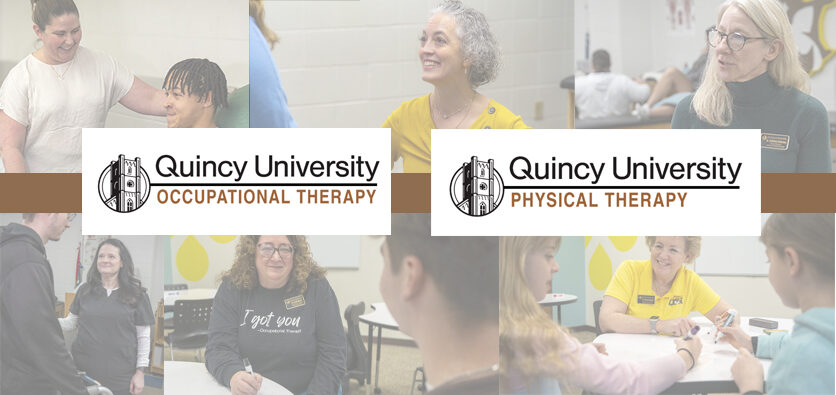
QU IS APPROVED TO OFFER DOCTORAL PROGRAMS IN OCCUPATIONAL THERAPY AND PHYSICAL THERAPY
Quincy University has received the permission of its institutional accreditor, the Higher Learning Commission, to offer doctoral degree programs in Occupational Therapy and in Physical Therapy. These clinical doctoral programs will prepare students for careers in high-demand healthcare fields and mark the first time the university will offer doctoral degrees in its 165-year history.
“As we announced recently, these new programs will meet important community needs and represent an important shift in the degree offerings of Quincy University,” said Brian McGee, PhD, QU president. “Today, we are pleased to acknowledge this recognition by our institutional accreditor of our preparation to offer these programs. We look forward to enrolling our first students in these programs.”
Both the occupational therapy and physical therapy programs will encompass flexible, hybrid formats for curriculum, blending online and in-person learning. Both programs will be led by highly qualified faculty and practitioners.
Pending candidacy from the Accreditation Council for Occupational Therapy Education, (ACOTE) and the Commission on Accreditation in Physical Therapy Education (CAPTE), the OTD and DPT programs will be offered beginning January 2026.
“Flexible, hybrid course delivery is the future of graduate healthcare education,” said Sarah Vordtriede-Patton, PhD, provost and vice president for academic affairs. “Our plans for occupational therapy and physical therapy have allowed us to recruit highly qualified faculty and will offer our students convenient and flexible options for completing the rigorous training required by these programs.”
The Quincy University occupational therapy doctoral program will be led by experienced faculty, including Dr. Kristin Haas, Dr. Paula Costello, and Dr. Jaime Garafalo-Peterson. The talented faculty supporting the physical therapy doctoral program will include Dr. Kathleen Galloway, Dr. Jacklyn Malt, Dr. Christina DeHoff, and Dr. Steven Karas. QU will continue to hire additional faculty and administrative support for both programs.
In support of new and existing academic programs, a $4.2 million capital projects grant from the State of Illinois has allowed the University to make facility renovations at its North Campus. Work continues to transform these underutilized administrative spaces into laboratories, classrooms and faculty and staff offices shared by the occupational therapy and physical therapy programs. Students in both hybrid programs will come to campus periodically for intensive lab experiences. In many cases, they will have the option to return home or travel elsewhere for their clinical experiences.
For more information about the Occupational Therapy Doctoral Program, contact Dr. Kristin Haas at occupationaltherapy@quincy.edu or visit http://www.quincy.edu/occupationaltherapy.
For more information about the Physical Therapy Doctoral Program, contact Dr. Kathleen Galloway at physicaltherapy@quincy.edu or visit www.quincy.edu/physicaltherapy.
“While these new programs will be our first graduate and doctoral programs in the health sciences, I expect there will be more in our future,” said McGee. “Over time, I expect we will see further graduate opportunities at QU for students seeking advanced training in high-demand professions. Our region needs these graduates.” “Years of preparation led to this moment, when QU has been given this permission by our accreditor,” added Vordtriede-Patton. “I am proud of all the faculty and staff whose hard work and dedication allow us to reach this milestone.”
Founded in 1860 by Franciscan friars, Quincy University is a small Catholic university emphasizing the sciences, liberal arts and the professions. Quincy University offers undergraduate, graduate and adult education programs integrating practical experience and Franciscan values. Faculty and advisors work with students to design customized success plans to help them graduate on time, find their passion and prepare them for life. QU is a member of NCAA Division II for intercollegiate athletics. For more information, please visit www.quincy.edu or contact the Office of Community Relations at (217) 228-5275 or communityrelations@quincy.edu. Quincy University. Success by Design.
The Quincy University entry-level occupational therapy doctoral degree program has applied for accreditation by the Accreditation Council for Occupational Therapy Education (ACOTE) of the American Occupational Therapy Association (AOTA), located at 7501 Wisconsin Avenue, Suite 510E, Bethesda, MD 20814. ACOTE’s telephone number c/o AOTA is (301) 652-AOTA and its web address is www.acoteonline.org. The program must be granted Candidacy Status, have a pre-accreditation review, complete an on-site evaluation, and be granted Accreditation Status before its graduates will be eligible to sit for the national certification examination for the occupational therapist administered by the National Board for Certification in Occupational Therapy (NBCOT). After successful completion of this exam, the individual will be an Occupational Therapist, Registered (OTR). In addition, all states require licensure to practice; however, state licenses are usually based on the results of the NBCOT Certification Examination. Note that a felony conviction may affect a graduate’s ability to sit for the NBCOT certification examination or attain state licensure. Additional information about certification is available at www.nbcot.org.
Graduation from a physical therapist education program accredited by the Commission on Accreditation in Physical Therapy Education (CAPTE), is necessary for eligibility to sit for the licensure examination, which is required in all states. The Commission on Accreditation in Physical Therapy Education,3030 Potomac Ave., Suite 100, Alexandria, Virginia 22305-3085, 703-706-3245; accreditation@apta.org. Candidacy is considered to be an accredited status, as such the credits and degree earned from a program with Candidacy status are considered, by CAPTE, to be from an accredited program. Therefore, students in the charter (first) class should be eligible to take the licensure exam even if CAPTE withholds accreditation at the end of the candidacy period. That said, it is up to each state licensing agency, not CAPTE, to determine who is eligible for licensure. Information on licensing requirements should be directed to the Federation of State Boards of Physical Therapy (FSBPT;www.fsbpt.org) or specific state boards (a list of state boards and contact information is available on FSBPT’s website). Quincy University is seeking accreditation of a new physical therapist education program from CAPTE. The program is planning to submit an Application for Candidacy, which is the formal application required in the pre-accreditation stage, on May 1, 2025. Submission of this document does not assure that the program will be granted Candidate for Accreditation status. Achievement of Candidate for Accreditation status is required prior to implementation of the professional phase of the program; therefore, no students may be enrolled in professional courses until Candidate for Accreditation status has been achieved. Further, though achievement of Candidate for Accreditation status signifies satisfactory progress toward accreditation, it does not assure that the program will be granted accreditation.


